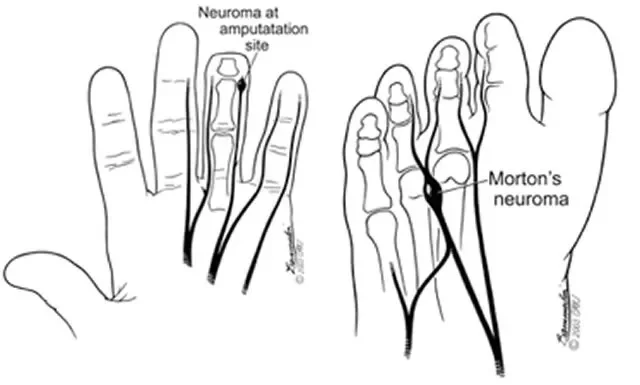
What is Neuroma?
A neuroma is a part of an irritated or injured nerve. The cause can be an acute injury that results in a laceration or contusion of a nerve. It can also be the result of repetitive trauma to a nerve. The most common neuroma is a Morton’s neuroma that usually occurs between the third and fourth toe and less commonly between the second and third toe. The bones of the toes, which produce compression, irritate the nerve.
What are the Symptoms?
Symptoms of a neuroma are pain, burning sensation, tingling and numbness in the area of the injured nerve. Bumping, lightly tapping or bearing weight on the injured nerve can increase the symptoms.
How is a Neuroma Diagnosed?
The diagnosis is made by history and physical exam. Your physician may press or tap on the nerve to see if this produces symptoms. In the case of a Morton’s neuroma, squeezing the bones at the ball of the foot together may increase symptoms. Your physician may order x-rays to see if any bone spurs are irritating the nerve. Occasionally, magnetic resonance imaging (MRI) will be done to visualize the neuroma. Injecting a local anesthetic around the nerve can temporarily relieve symptoms and aid in diagnosis.
What is the Treatment for a Neuroma?
In the case of a neuroma caused by repetitive trauma, eliminating the trauma or wearing braces or padding to protect the nerve may help. In the case of Morton’s neuroma, proper shoe wear can often relieve symptoms. Your physician may use cortisone injections or other medicines to decrease inflammation around the nerve and diminish pain. Physical therapy will often be used to help decrease irritation around the nerve.
If the neuroma is the result of a lacerated nerve, repairing the nerve will often provide relief. In other cases, surgical removal of the neuroma may be necessary. If the neuroma is due to nerve irritation from a bone spur or scar tissue, this can be addressed with surgery. UofL Health – Hand Care is prepared to guide you to the best option for treatment.
For more information or to schedule an appointment please contact us at 502-561-4263 or 1-800-477-4263. To request an appointment online, use our Appointment Request Form.


